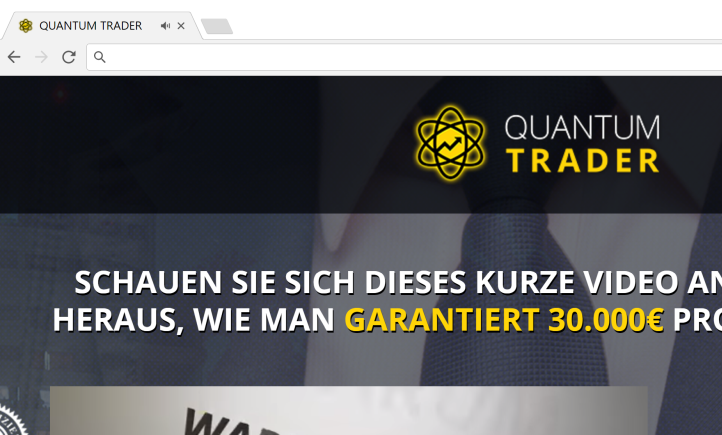Imagine turning a small $100 investment into over $5000 in profit in less than a week. That’s the tantalizing offer being dangled in front of countless victims by Quantum AI, a sinister scam operation exploiting trust in figures like Elon Musk. In doctored videos spreading across social media, an AI-rendered Elon Musk guarantees users will become millionaires nearly overnight using Quantum AI’s “revolutionary trading algorithms.” Of course it’s all an elaborate ruse devised to steal people’s hard-earned money.
- An In-Depth Overview of The Elaborate Quantum AI Scam
- Breaking Down the Quantum AI Scam Playbook
- Scammers Leverage Messaging Apps to Direct Victims to Quantum AI’s Web of Deception
- How to Identify The Quantum AI Scam
- Elon Musk, Tucker Carlson and MrBeast Falsely Tied to Quantum AI
- Actions to Take if You Were Deceived by Quantum AI
- Frequently Asked Questions About the Quantum AI Scam
- The Bottom Line – How to Avoid Falling Prey to the Quantum AI Investment Scam
In this extensive expose, I’ll be revealing the cunning tactics that have allowed the fraudsters behind Quantum AI to con millions with their high-tech facade and brazen lies. Let’s peel back the layers on this deception so we can stop it.






An In-Depth Overview of The Elaborate Quantum AI Scam
Quantum AI is a dangerous investment scam operation that has been deceiving victims through the use of fake celebrity endorsement videos, false promises, and a network of fraudulent websites. This elaborate ruse has raised multiple red flags among financial cybersecurity experts.
The scammers first promoted Quantum AI in early 2023 via deepfake videos of celebrities like Elon Musk distributed across social media. Advanced voice cloning technology allows them to precisely imitate famous figures who appear to enthusiastically endorse Quantum AI in the fabricated footage.
For example, one viral Facebook video shows a simulated Richard Branson stating: “With Quantum AI’s AI-powered platform, I was able to turn my small investment of $300 into over $53,000 in profit in just 3 days! It’s fully automated and hands-free. Everyone needs to check this out before it’s too late.”
In another deceptive video made to look like a FOX News segment, a fake Tucker Carlson discusses Quantum AI as the hottest new work-from-home opportunity making Americans rich. Doctored footage shows MrBeast and Mark Cuban revealing how Quantum AI changed their lives after earning over $20,000 daily returns.
These videos aim to make Quantum AI appear legitimate, verified, and highly profitable. But in reality, celebrities have never endorsed it. Their likenesses are misappropriated through AI techniques.
The scammers operate a network of fraudulent websites to promote Quantum AI beyond just the videos. New sites are constantly launched with slightly altered domain names to avoid blacklists and scrub previous negative reviews/exposure.
Once on the sites, aggressive pop-up sales tactics pressure visitors to immediately fund accounts and access the advertised “AI trading technology.” This initiates a cycle of coercing larger deposits before the scammers eventually cut off access and disappear with victims’ money.


In summary, Quantum AI exhibits every characteristic of an investment scam bilking victims through:
- Fake Elon Musk, Tucker Carlson and MrBeast endorsement videos
- Doctored news reports promoting the scam
- Constantly shifting networks of fraudulent websites
- Unrealistic guaranteed profits without evidence
- High-pressure sales tactics pushing quick deposits
- Anonymous scammers hiding their identities
No credible evidence verifies Quantum AI’s legitimacy. The platform appears solely created to propagate scam content and steal deposits through deception. Extreme caution is advised, as Quantum AI follows the blueprint of fraudulent schemes stealing millions by exploiting trust in celebrities. Understanding their tactics is key to avoiding becoming a victim.
Breaking Down the Quantum AI Scam Playbook
The masterminds behind the Quantum AI scam have crafted an intricate multi-layered scheme designed to ensnare victims and steal their hard-earned money. This fraudulent operation utilizes fake celebrity ads, doctored news articles, and malicious websites in unison to carry out systematic deception.
Here is an extensive look at how each step of this elaborate ruse works:
Step 1 – Flooding Social Media With Fake Celebrity Endorsement Ads
The cornerstone of the Quantum AI scam is an onslaught of deceptive ads spread across platforms like Facebook, Instagram, YouTube, and TikTok. These video and display ads falsely claim that famous celebrities and business leaders have endorsed Quantum AI as a foolproof money-making method.
The scammers use advanced deepfake technology to realistically simulate endorsements from figures like Elon Musk, MrBeast, Mark Cuban, and even major news anchors. Voice cloning algorithms precisely mimic the vocal patterns of the celebrities, who then appear to enthusiastically vouch for Quantum AI in the fabricated footage.
For example, one ad shows a simulated Tom Cruise stating: “With the AI-powered trading algorithms at Quantum AI, I’ve earned over $38,000 per day completely on autopilot. This is a life-changing opportunity that everyone needs to get in on immediately!”
The deceptive endorsement ads link to what appears to be news reports further touting Quantum AI’s credibility. Their sheer volume and reach helps them propagate rapidly across social platforms, snaring the attention of millions of potential victims.
Step 2 – Directing Victims Through Elaborate Fake News Pages
Clicking the endorsement ads leads victims to AI-generated fake business news reports that mimic established outlets like CNN, MSNBC, BBC, and Forbes. These forged articles employ logos, branding, and graphics copied from legitimate sites to appear 100% authentic.
They describe Quantum AI as a revolutionary automated trading platform making everyday people wealthy beyond imagination. Doctored video clips show celebrities being interviewed about how Quantum AI changed their lives after easily earning tens of thousands per day.
For example, a fabricated Forbes post includes a video clip of an AI-rendered Simon Cowell stating: “Within one month of using Quantum AI’s robo-trading algorithms, I was pulling in over $56,000 per day working from home. As a businessman, I’m endorsing this to everyone as the real deal!”
The fake news reports lend an air of credibility and verification to Quantum AI right as victims are about to reach the actual scam site. This helps override doubts victims may have.
Step 3 – Funneling Victims to Constantly Emerging Scam Websites
The fraudulent news articles will include prominent links and buttons prompting readers to “Join Now”, “Start Profiting”, or “Become a Millionaire”. These eye-catching calls-to-action lead directly to the network of active Quantum AI scam websites.
New iterations of the scam site constantly emerge using slightly altered domain names like ai-tradepro.co, alpha-tradepro.net, or aitradesystems.io to sustain the operation.
The scam sites exhibit typical hallmarks: bold claims of unattainable profits, fake urgency tactics, and absolutely no documentation. Trying to research them leads nowhere, as their domains are often anonymously registered and tied to offshore shell companies.
Step 4 – Pressuring Victims to Open Accounts and Deposit
Once prospective victims land on the scam site, popup dialog boxes immediately work to convert them into deposits. Victims are urged to open accounts right now and fund them instantly to gain access to Quantum AI’s advertised automated trading technologies.
Fake balances may be displayed showing large initial gains after depositing, all designed to manipulate victims into investing more before eventually cutting off account access entirely. No actual trading occurs, merely simulations using a scam dashboard.
In reality, all deposited funds go straight into the scammers’ crypto wallets or offshore accounts. But victims are led to believe the sophisticated AI algorithms being marketed will multiply their money exponentially.
Step 5 – Leveraging Deposits to Manipulate Bigger Ones
After the initial deposit, the scammers employ additional psychological tactics to extract even larger payments. Fake notifications will inform victims of amazing market opportunities detected by Quantum AI’s algorithms. More contributions are coerced out of victims baited by the prospects of bigger profits.
Small withdrawals may be allowed at first to build a sense of trust and legitimacy. This convinces victims to invest substantially more before the scammers eventually cut off account access and disappear.
Step 6 – Draining Victim Funds and Vanishing
Once satisfactory funds have been stolen, the scammers simply disable all account access, shut down the scam site, and vanish with victims’ money. Cryptocurrency deposits are immediately laundered and withdrawn into cold storage.
Fiat currency deposits flow through shell companies and money mules, making funds extremely difficult to recover or trace. The websites are deactivated and re-emerge under new domains with no traces of their past incarnation.
Victims are left with no recourse, having fallen for the elaborate illusion meticulously crafted through AI-generated content and psychologically manipulative tactics. All told, the Quantum AI scam reflects the increasing sophistication of online investment frauds in the digital age.
By scrutinizing each step of the process, people can equip themselves to recognize the manipulation and deception. Understanding the scope of resources and planning behind such scams will hopefully help potential victims avoid being defrauded.
Scammers Leverage Messaging Apps to Direct Victims to Quantum AI’s Web of Deception
In addition to the high-production videos and websites, the cunning scammers behind Quantum AI have also started leveraging private messaging apps like WhatsApp and Telegram to promote their scam to potential victims.
They create large WhatsApp and Telegram group chats or channels that present Quantum AI as an incredible opportunity for guaranteed profits. Fake screenshots of massive earnings are shared to entice victims to join.
Once a victim joins the group, the scammers employ manipulative sales tactics and social engineering to build false friendships and gain trust. This is often done through an advanced technique called “pig butchering” – where scammers take weeks posing as mentors to slowly manipulate the victim into bogus opportunities.
Eventually, the scammers start name dropping Quantum AI, claiming it’s an automated trading system they both can benefit wildly from. More fake screenshots depict the scammers earning tens of thousands per day from the platform.
When the victim shows interest, the scammers then privately send links to the network of fraudulent Quantum AI websites, urging the victim to sign up immediately and fund their account.
This intimate 1-on-1 format over messaging apps helps the scammers establish relationships with victims and override skepticism before directing them straight into the trap – the constellation of deceptive scam websites designed to steal deposits.
In summary, extreme caution should be exercised when receiving investment offers from new contacts on messaging apps – especially involving guarantees of easy money. Verify identities first, watch for phony friendship bonding tactics, and avoid sites you are linked to. Messaging apps provide the scammers behind Quantum AI with a covert channel to direct victims into their web of deception. Stay vigilant.
How to Identify The Quantum AI Scam
While the masterminds behind Quantum AI have developed an elaborate scam operation, there are several key signs that can help you identify and avoid falling victim:
Celebrity Endorsements That Seem Too Good to Be True
If a trading platform or money-making opportunity is touted as endorsed by high-profile celebrities or business leaders, double check the claims. Quantum AI uses deepfake videos to falsely imply endorsements. Verify through the celebrities’ verified social media accounts or representative if they actually back the platform. Be extra skeptical of endorsement claims in emails or online ads.
Guaranteed High Returns With No Proof
Claims of generating returns of $500, $1000 or more per day with little effort should immediately raise red flags. Legitimate investments seldom promise outcomes with such unrealistic certainty. Quantum AI advertises proven profits without providing documentation in classic scam fashion. If excessively high returns seem guaranteed, it is likely a fraud.
Aggressive Sales Tactics and False Urgency
Scam platforms often try to push immediate decisions by creating false urgency and scarcity. Quantum AI employs fake timers and limited time offers to drive fear of missing out. High-pressure sales tactics are meant to bypass your critical thinking. Never rush into “urgent opportunities” without doing proper due diligence first.
Anonymous Scammers Concealing Identities
Research who is behind an investment opportunity before providing any personal or financial information. Quantum AI is run entirely anonymously with no transparency or company details. Lack of leadership information is a major warning sign, as scammers hide to avoid accountability. Dealing with anonymous groups online significantly raises risk.
Lack of Documentation and Registration Details
Reputable financial firms provide documentation to verify track records and holdings. Quantum AI offers no legal registration, performance reports, bank statements or other paperwork – another red flag. Confirm companies are registered businesses with licenses to operate in your state or country.
Too Good to Be True Claims on Websites
Scam websites often overflow with images of wealth alongside incredible claims aimed to tempt you. Quantum AI’s website hypes perfect happiness gained through astronomical profits. Be wary if a website seems to sell not just a product but a lifestyle or dream. Verify specifics like member testimonials or you risk getting defrauded.
Staying vigilant to these warning signs can help you avoid being swindled by Quantum AI or similar scams. Your best protection is always healthy skepticism, thorough research, and never acting in haste.
Elon Musk, Tucker Carlson and MrBeast Falsely Tied to Quantum AI
It is important to explicitly state that high-profile figures like Elon Musk, Tucker Carlson, and MrBeast have no actual affiliation or involvement with the fraudulent Quantum AI platform.
The scam’s operators have stolen their likenesses using sophisticated deepfake techniques to create fictitious videos where Musk, Carlson, and Beast appear to enthusiastically endorse and profit wildly from Quantum AI. But these endorsements are completely fabricated without consent.
In reality, there is absolutely no evidence any of these well-known individuals have ever promoted, invested in, or earned money through the deceptive Quantum AI scam. The deepfake videos are designed solely to manipulate viewers by exploiting trust in these familiar figures.
No public statement, disclosure or record links Elon Musk, Tucker Carlson or MrBeast to Quantum AI in any capacity. They surely have no need to endorse a suspicious trading program promising ridiculous profits with no documentation.
The scam’s operators selected these particular celebrities due to their influential status and likely public believability. But the fraudulent nature of Quantum AI is laid bare by the disturbing unauthorized use of their likenesses.
As this scam continues evolving, it is crucial the record show these high-profile figures have no real involvement with Quantum AI. The deepfake appearances aim only to unlawfully bolster the scammers’ deceitful operation. We must remain vigilant against such dishonest tactics.
Actions to Take if You Were Deceived by Quantum AI
Unfortunately, countless trusting people have already been ensnared by the elaborate Quantum AI scam. If you were deceived and lost money, here are some important steps to take right away:
Step 1: Report it to authorities
Report Quantum AI immediately to agencies like the Federal Trade Commission, Internet Crime Complaint Center, Securities Exchange Commission, and your local law enforcement. Providing documentation of how the scam worked can help authorities track down those responsible and potentially lead to recovering some losses.
Step 2: Inform your bank and freeze accounts
If you paid by credit card, dispute the charges right away. If you used wire transfers or other methods, inform your bank and request that they freeze your linked accounts to prevent further unauthorized withdrawals by the scammers.
Step 3: Watch out for recovery scams
Beware follow-up contact from anyone claiming they can recover your lost funds for an upfront fee. This is always a fraudulent “recovery scam” tactic used to victimize people twice. Government agencies will never ask for upfront fees.
Step 4: Report fake celebrity ads and websites
Report the deceptive Quantum AI ads, videos and websites to the social media platforms and web hosts used. Provide as much detail as possible to get all associated accounts suspended to prevent more victims.
Step 5: Spread awareness about the scam tactics
The more public awareness about Quantum AI, the fewer future victims. Share your experience through social media and consumer advocacy sites. Spread media literacy about the deceptive deepfake technology and manipulation tactics used to perpetuate the scam.
While losses to schemes like Quantum AI are devastating, taking proactive countermeasures can help curb the impact. Reporting to authorities, freezing accounts, avoiding recovery scams, and spreading awareness are key first actions after being victimized. With vigilance and education, we can fight back against these deceptive frauds exploiting innocent people online.
Frequently Asked Questions About the Quantum AI Scam
1. What is Quantum AI?
Quantum AI first emerged in early 2023 and was heavily promoted through social media ads as an automated cryptocurrency trading platform. However, it is a fraudulent operation designed to steal user deposits through deception.
2. How does the Quantum AI scam work?
The scammers behind Quantum AI promote it using deepfake celebrity endorsement videos and fabricated news articles. These direct victims to constantly shifting scam website networks that utilize false promises of profits to manipulate users into opening accounts and depositing funds. The scammers then cut off access and disappear with the money.
3. What tactics does the Quantum AI scam use?
Key deception tactics include:
- Deepfake videos of celebrities like Elon Musk promoting the scam
- Doctored news segments discussing Quantum AI as legitimate
- Fake limited time offers and guaranteed profits without evidence
- Aggressive sales popups on the scam sites pushing immediate deposits
- Allowing small withdrawals initially to build trust and lure bigger deposits
4. How can I identify Quantum AI as a scam?
Warning signs include too-good-to-be-true profit guarantees, lack of audited performance reports, constantly shifting website domains, anonymous team behind it, and requiring deposits before any trading can occur. Lack of physical headquarters, contacts, licensing, or documentation are also red flags.
5. I lost money to Quantum AI – what should I do?
If you fell victim, immediately report it to authorities, inform your bank to potentially freeze linked accounts, avoid any recovery scams, report the deceptive ads/sites used, and spread awareness about the scam tactics to help protect others.
6. How can I avoid Quantum AI and other investment scams?
Conduct thorough due diligence, ignore unsolicited opportunities, watch for pressure to invest quickly, verify endorsers and opportunities independently, and always remember that promises of guaranteed returns with no risk are the hallmarks of scams.
7. How are scammers promoting Quantum AI on messaging apps?
Scammers are creating WhatsApp and Telegram groups posing as mentors and directing members to the Quantum AI websites through phishing links, utilizing social engineering tactics to build trust before exposing their true intent.
8. Can I get my money back if I was scammed by Quantum AI?
Recovery of lost funds is very rare with scams like Quantum AI that involve untraceable cryptocurrency payments and fake entities designed to launder money. Reporting it immediately provides the best chance, but most victims are unable to recoup their stolen deposits.
9. Is Quantum AI legal?
No. Quantum AI is an illegal fraudulent operation. Their Celebrity endorsement videos are unauthorized. The platform has no valid financial licenses for trading or investment activities.
10. How can I report Quantum AI?
To report Quantum AI as a scam, contact the SEC, CFTC, FTC, FBI, IC3 and local authorities. Provide as many details as possible about how the scam works including website domains, social media pages, videos and accounts being used to promote it. The more evidence provided to authorities, the better chance they can pursue actions to shut the scam down.
The Bottom Line – How to Avoid Falling Prey to the Quantum AI Investment Scam
Quantum AI may present the tantalizing promise of easy passive wealth through advanced AI trading algorithms, but the reality is this platform is nothing more than an elaborate ruse designed to defraud and steal. Learning to spot and avoid schemes like Quantum AI is crucial to protect yourself in an age where technology enables scammers to create increasingly deceptive facades. Here is a summary of key actions you can take:
1. Verify Endorsers and Opportunities Independently
Never take endorsements or opportunities at face value – especially from strangers online. Independently confirm that endorsements are legitimate and endorsed individuals are aware and compliant. Search for any evidence tying them to potential scams. And thoroughly vet any companies and platforms before sharing personal information or deposits.
2. Analyze Websites Carefully
Closely scrutinize websites promoting investment opportunities. Watch for stock imagery, grammar errors, missing contact info, changing URLs and other red flags. Search WHOIS records to see if domain owners are anonymous. Professionally made sites can still be fraudulent.
3. Research Social Media Profiles and Posts
Don’t just look at content quality. Audit profiles sharing investment opportunities for signs of inauthenticity like low friend/follower counts, zero interaction on posts, and new accounts. Many scammers create networks of fake influencer accounts to propagate scams.
4. Beware of “Act Now” High Pressure Tactics
Any investment opportunity demanding immediate action without providing documentation should be assumed highly suspicious. Scammers create false urgency to override diligence. Slow down and take time to thoroughly vet any opportunity and confirm its legitimacy.
5. Understand Promises of Guaranteed Returns Are Always Scams
True investments always carry risk. Consistent high returns are unsustainable long-term for any vehicle. Claims of earning 5-10% daily guaranteed returns that anyone can achieve are false promises designed to manipulate you into a scam. Avoid them.
6. Watch for Limited Time Offers and Other FOMO Tactics
Scammers leverage tactics like fake deadlines, limited seating claims, and exclamations that opportunities are ending soon. These all prey upon a victim’s fear of missing out to cloud judgement and force quick action. Take a step back if you feel this FOMO pressure.
7. If Unsure, Seek Out Objective Expert Opinions
There are many independent financial professionals willing to provide free consultations and evaluations of opacity investment opportunities. They can analyze documents, licenses and risk factors to determine if something passes the sniff test or exhibits scam characteristics. Seeking unbiased second opinions can provide clarity.
8. Trust Your Instincts
If an investment seems too good to be true, it probably is. Learn to trust your intuition. Scammers use increasingly advanced techniques to override instincts and create believable facades. But your gut reaction can still judge when something just doesn’t feel right or real.
By taking these proactive steps of independent vetting, avoiding emotional manipulation, seeking expert guidance and trusting your intuition, you can avoid devastating scams like Quantum AI. Being informed and vigilant is your best defense against this new era of highly deceptive frauds exploiting those eager for financial security.



